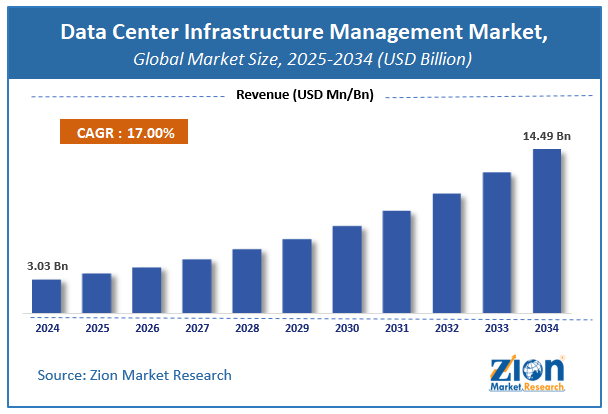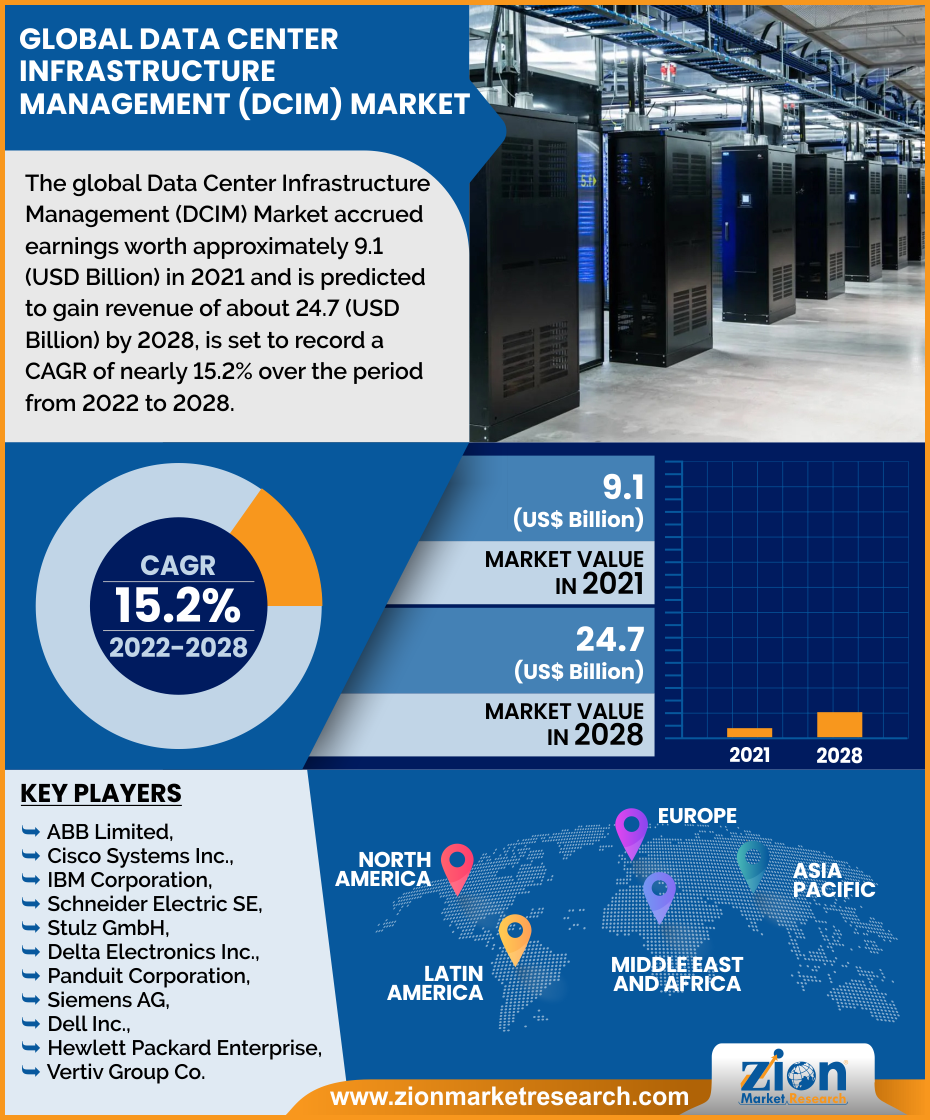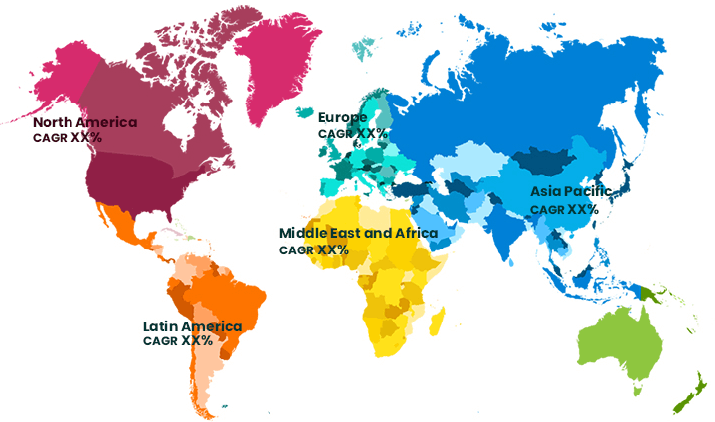Global Data Center Infrastructure Management (DCIM) Market Size, Share, Growth Analysis Report - Forecast 2034

Data Center Infrastructure Management (DCIM) Market By Application (Business Intelligence & Analytics, Power Monitoring, Capacity Planning, Asset Management, and Environment Monitoring), By Deployment (Cloud and On-Premise), Data Center Type (Cloud & Edge Data Center, Colocation Data Center, Managed Data Center, and Enterprise Data Center), Component (Services and Solution), End-User (Healthcare, IT & ITES, BFSI, Government & Public Sector, and Telecommunication), and By Region: Global and Regional Industry Overview, Market Intelligence, Comprehensive Analysis, Historical Data, and Forecasts 2025 - 2034
| Market Size in 2024 | Market Forecast in 2034 | CAGR (in %) | Base Year |
|---|---|---|---|
| USD 3.03 Billion | USD 14.49 Billion | 17% | 2024 |
Data Center Infrastructure Management (DCIM) Market: Industry Perspective
The global data center infrastructure management (DCIM) market size was worth around USD 3.03 Billion in 2024 and is predicted to grow to around USD 14.49 Billion by 2034 with a compound annual growth rate (CAGR) of roughly 17% between 2025 and 2034. The report analyzes the global data center infrastructure management (DCIM) market's drivers, restraints/challenges, and the effect they have on the demands during the projection period. In addition, the report explores emerging opportunities in the data center infrastructure management (DCIM) industry.
The report analyzes the global data center infrastructure management (DCIM) market's drivers, restraints/challenges, and the effect they have on the demands during the projection period. In addition, the report explores emerging opportunities in the data center infrastructure management (DCIM) industry.
Data Center Infrastructure Management (DCIM) Market: Overview
Data center infrastructure management software monitors, measures, manages, and controls data center resources & power consumption of both IT-related device & facilities infrastructure components. They are data-center specific and utilized for optimizing data center power, cooling, and physical space. Effective managing of data center resources has become necessary as data center capacity is expanding rapidly and consuming large proportion of financial funds along with contributing towards GHG emissions in atmosphere. With rise in costs of data centers, it has become necessary for managers to curb inefficiencies and check increasing costs.
This has resulted in massive demand for effective data center infrastructure management activities in recent years. Apart from this, demand for data center capacity is set to expand at rate of over 10.1% in next few years with swift automation of business processes, complex analytics, and surge in consumer data. Moreover, any inefficiency in managing data centers can result in huge losses and impact profitability of business, thereby resulting in need for strong & effective data center infrastructure management.
Additionally, data centers offer firms competitive edge and are underpin to success in corporate world. Proficient data center infrastructure management activities can impel efficiency, utility, and availing of data center resources & solutions. Increase in people, processes, and technology combined with effective data center infrastructure management strategies will drive growth of the IT sector and contribute significantly towards data center infrastructure management market size. Gap analysis has proved that there is a greater & urgent need for effective data center infrastructure management activities for improving performance of people, processes, and technology in companies, and this is projected to bring a paradigm shift in data center infrastructure management (DCIM) market.
Key Insights
- As per the analysis shared by our research analyst, the global data center infrastructure management (DCIM) market is estimated to grow annually at a CAGR of around 17% over the forecast period (2025-2034).
- Regarding revenue, the global data center infrastructure management (DCIM) market size was valued at around USD 3.03 Billion in 2024 and is projected to reach USD 14.49 Billion by 2034.
- The data center infrastructure management (DCIM) market is projected to grow at a significant rate due to rising demand for energy-efficient data centers, increasing cloud adoption, growth in hyperscale facilities, and the need for real-time monitoring and automation.
- Based on Application, the Business Intelligence & Analytics segment is expected to lead the global market.
- On the basis of Deployment, the Cloud segment is growing at a high rate and will continue to dominate the global market.
- Based on the Data Center Type, the Cloud & Edge Data Center segment is projected to swipe the largest market share.
- By Component, the Services segment is expected to dominate the global market.
- In terms of End-User, the Healthcare segment is anticipated to command the largest market share.
- Based on region, North America is predicted to dominate the global market during the forecast period.
Data Center Infrastructure Management (DCIM) Market: Dynamics
Key Growth Factors:
Demand For Cost Reduction & Capacity Expansion To Contribute Towards Market Size
With perfect cloud solutions, firms are modernizing & consolidating IT infrastructure, automating workloads, and becoming more agile, thereby paving the way for the growth of the data center infrastructure management (DCIM) industry. The need for transforming business functions, expanding data center capacity, and reducing costs of data centers along with gauging efficacy & performance of data center operations has translated into the huge necessity for efficient data center infrastructure management activities.
Restraints:
Failed Software Installations To Hinder Business
There has been a chunk of failed implementations of DCIM software in some of the firms, though many organizations have witnessed successful deployment of software. Reportedly, nearly one-fourth of firms have complained of unsuccessful deployment of DCIM software in recent years.
Opportunities:
Preference Towards Cloud-Based Installations To Offset On-Premise Deployment Hurdles
Large numbers of firms are distributing their computational resources across a slew of environments such as cloud servers, physical tools, and edge data centers. With the rapid spread of COVID-19, firms are accessing data from remote locations through secured cloud servers installed at data centers. Large-scale acceptance of software as service solutions has promoted cloud-based DCIM software server installations in data centers over on-premise or physical deployment of software servers, thereby generating new growth opportunities for the data center infrastructure management (DCIM) market.
Challenges:
Difficulties Experienced In Integration Of Real-Time Equipment With Operating Data Center
Many conventional data center devices including computer room air handlers, UPS, cooling towers, and chillers lack smart energy meters & environmental sensors. This has posed a threat to the growth of the data center infrastructure management (DCIM) market.
Data Center Infrastructure Management (DCIM) Market: Segmentation Analysis
The global data center infrastructure management (DCIM) market is segmented based on Application, Deployment, Data Center Type, Component, End-User, and region.
Based on Application, the global data center infrastructure management (DCIM) market is divided into Business Intelligence & Analytics, Power Monitoring, Capacity Planning, Asset Management, and Environment Monitoring.
On the basis of Deployment, the global data center infrastructure management (DCIM) market is bifurcated into Cloud and On-Premise.
By Data Center Type, the global data center infrastructure management (DCIM) market is split into Cloud & Edge Data Center, Colocation Data Center, Managed Data Center, and Enterprise Data Center.
In terms of Component, the global data center infrastructure management (DCIM) market is categorized into Services and Solution.
By End-User, the global Data Center Infrastructure Management (DCIM) market is divided into Healthcare, IT & ITES, BFSI, Government & Public Sector, and Telecommunication.
Data Center Infrastructure Management (DCIM) Market: Report Scope
| Report Attributes | Report Details |
|---|---|
| Report Name | Data Center Infrastructure Management (DCIM) Market |
| Market Size in 2024 | USD 3.03 Billion |
| Market Forecast in 2034 | USD 14.49 Billion |
| Growth Rate | CAGR of 17% |
| Number of Pages | 188 |
| Key Companies Covered | ABB Limited, Cisco Systems Inc., IBM Corporation, Schneider Electric SE, Stulz GmbH, Delta Electronics Inc., Panduit Corporation, Siemens AG, Dell Inc., Hewlett Packard Enterprise, Vertiv Group Co, and others. |
| Segments Covered | By Application, By Deployment, By Data Center Type, By Component, By End-User, and By Region |
| Regions Covered | North America, Europe, Asia Pacific (APAC), Latin America, The Middle East and Africa (MEA) |
| Base Year | 2024 |
| Historical Year | 2020 to 2024 |
| Forecast Year | 2025 to 2034 |
| Customization Scope | Avail customized purchase options to meet your exact research needs. Request For Customization |
Data Center Infrastructure Management (DCIM) Market: Regional Analysis
Asia Pacific Data Center Infrastructure Management (DCIM) Market To Register Highest CAGR Over 2022-2028
The growth of the data center infrastructure management (DCIM) industry in Asia Pacific over the next six years can be due to the rise in the use of machine learning and IoT in public & private firms across countries such as Japan, South Korea, Taiwan, Singapore, Japan, and China. For the record, in its 2020 budget, the South Korean Government allocated nearly US$ 3.91 billion for AI and 5G.
However, North America is predicted to dominate the data center infrastructure management (DCIM) market in terms of revenue size owing to the rise in the use of smartphone broadband, big data analytics, and cloud computing by IT firms. With the reduction in server costs and acceptance of cloud computing tools, the market is predicted to flourish in the region over the forecasting timeframe.
Recent Developments:
Participants in the DCIM business are keen on introducing new software tools. Citing an instance, in November 2021, Siemens AG launched an open industrial edge new ecosystem IT tool. Moreover, it facilitates easy installation of IT systems & apps in the manufacturing domain, thereby facilitating B2B end-users in buying & operating a large number of software components available within a singular tool.
Furthermore, in October 2021, Sunbird software introduced a new dcTrack solution enabling clients to effectively handle data centers, edge sites, and labs from off-sites or remote locations.
Data Center Infrastructure Management (DCIM) Market: Competitive Analysis
The report provides a company market share analysis to give a broader overview of the key market players. In addition, the report also covers key strategic developments of the market, including acquisitions & mergers, new product launches, agreements, partnerships, collaborations & joint ventures, research & development, and regional expansion of major participants involved in the data center infrastructure management (DCIM) market on a global and regional basis.
The global data center infrastructure management (DCIM) market is dominated by players like:
- ABB Limited
- Cisco Systems Inc.
- IBM Corporation
- Schneider Electric SE
- Stulz GmbH
- Delta Electronics Inc.
- Panduit Corporation
- Siemens AG
- Dell Inc.
- Hewlett Packard Enterprise
- Vertiv Group Co
The global data center infrastructure management (DCIM) market is segmented as follows;
By Application
- Business Intelligence & Analytics
- Power Monitoring
- Capacity Planning
- Asset Management
- and Environment Monitoring
By Deployment
- Cloud
- On-Premise
By Data Center Type
- Cloud & Edge Data Center
- Colocation Data Center
- Managed Data Center
- and Enterprise Data Center
By Component
- Services
- Solution
By End-User
- Healthcare
- IT & ITES
- BFSI
- Government & Public Sector
- and Telecommunication
By Region
- North America
- The U.S.
- Canada
- Mexico
- Europe
- France
- The UK
- Spain
- Germany
- Italy
- Rest of Europe
- Asia Pacific
- China
- Japan
- India
- Australia
- South Korea
- Rest of Asia Pacific
- The Middle East & Africa
- Saudi Arabia
- UAE
- Egypt
- Kuwait
- South Africa
- Rest of the Middle East & Africa
- Latin America
- Brazil
- Argentina
- Rest of Latin America
Table Of Content
Methodology
FrequentlyAsked Questions
The global data center infrastructure management (DCIM) market is expected to grow due to increasing demand for energy-efficient data centers, rising adoption of cloud computing, advancements in AI-driven analytics, and growing focus on real-time monitoring and automation.
According to a study, the global data center infrastructure management (DCIM) market size was worth around USD 3.03 Billion in 2024 and is expected to reach USD 14.49 Billion by 2034.
The global data center infrastructure management (DCIM) market is expected to grow at a CAGR of 17% during the forecast period.
North America is expected to dominate the data center infrastructure management (DCIM) market over the forecast period.
Leading players in the global data center infrastructure management (DCIM) market include ABB Limited, Cisco Systems Inc., IBM Corporation, Schneider Electric SE, Stulz GmbH, Delta Electronics Inc., Panduit Corporation, Siemens AG, Dell Inc., Hewlett Packard Enterprise, Vertiv Group Co, among others.
The report explores crucial aspects of the data center infrastructure management (DCIM) market, including a detailed discussion of existing growth factors and restraints, while also examining future growth opportunities and challenges that impact the market.
Choose License Type
RelatedNews
HappyClients
Zion Market Research
Tel: +1 (302) 444-0166
USA/Canada Toll Free No.+1 (855) 465-4651
3rd Floor,
Mrunal Paradise, Opp Maharaja Hotel,
Pimple Gurav, Pune 411061,
Maharashtra, India
Phone No +91 7768 006 007, +91 7768 006 008
US OFFICE NO +1 (302) 444-0166
US/CAN TOLL FREE +1 (855) 465-4651
Email: sales@zionmarketresearch.com
We have secured system to process your transaction.
Our support available to help you 24 hours a day, five days a week.
Monday - Friday: 9AM - 6PM
Saturday - Sunday: Closed








